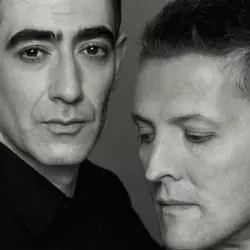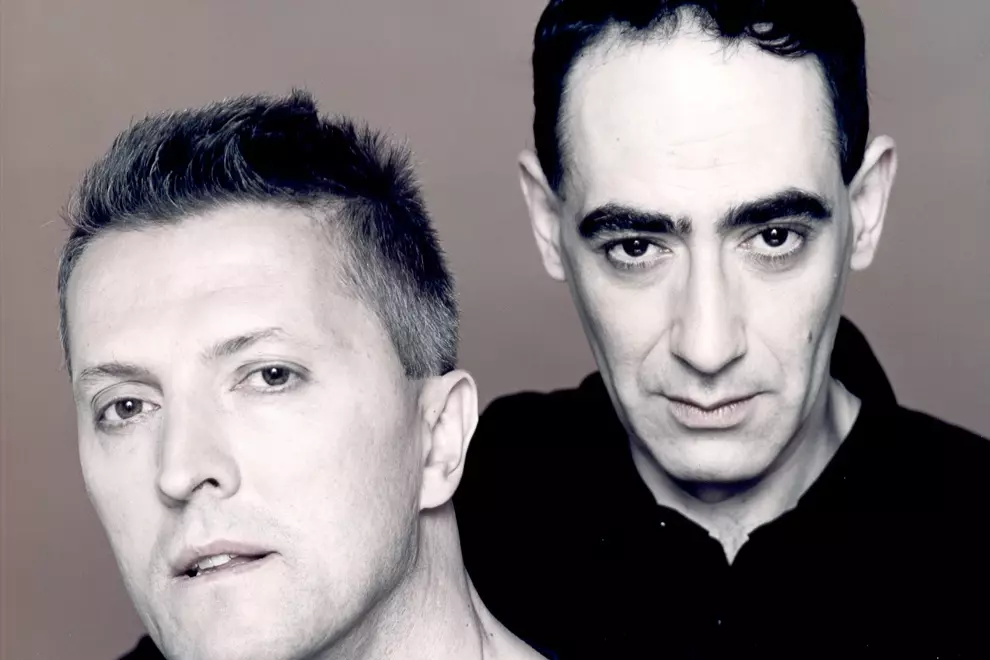 DAF
DAFThe German electro-punks Deutsch Amerikanische Freundschaft (meaning German American Friendship) prefigured EBM (electronic body music), acid house and techno at the start of the '80s. But Gabriel "Gabi" Delgado-López and Robert Görl have never conformed to even any counterculture. Indeed, four decades on, DAF remain resistors, and disruptors.
In November, DAF will finally premiere in Australia as the exclusive headliners of Melbourne Music Week's tenth anniversary edition. The news astonished those electro boffins who didn't realise that DAF were extant. In fact, DAF have broken up multiple times, actually announcing a Goodbye Tour in 2015. But that creative volatility serves a function, DAF frontman Delgado-López jokes. "We are both radical artists, yeah? And because we are very, very different persons – in spirit, our way of living, in everything – we sometimes have serious difficulties coming together. Sometimes everything's fine, and sometimes we have very different points of view – of music, lyrics – and those times we can't come together and we are not working together. We'd rather really split up and have a radical cut than pretend we are still doing something together when we are not... When DAF goes to the studio, Robert and me, we don't compromise – never. Never. Everything must be approved by both of us."
"We'd rather really split up and have a radical cut than pretend we are still doing something together when we are not."
Outgoing, mirthful and ironic, Delgado-López typically ends sentences with an affirmative "yes?". As innovators, DAF are often overlooked. However, they generated early hype in the UK. DAF were championed by the broadcaster John Peel and graced NME's cover. The critic Simon Reynolds has since described them as "prophetic".
Delgado-López was born in Francoist Spain. His anti-fascist parents escaped Córdoba, Andalusia for Germany, seeking sanctuary and employment, initially leaving him in a grandmother's care. Reunited, the working-class family settled in Düsseldorf (Delgado-López now again lives in Spain). A young punk, Delgado-López encountered the enigmatic musician Görl in a legendary local bar, the Ratinger Hof. DAF developed into a full punk band. But, following two LPs (one Mute Records' first-ever album, Die Kleinen Und Die Bösen, or 'The Small Ones And The Evil Ones'), DAF shrunk back into a duo with Görl handling drums and electronics. The Neoterics rebelled against their Teutonic predecessors, including Düsseldorf's most famed kosmische exponents, Kraftwerk. DAF's anomalous sequencer music was outrageously strident, rhythmically grinding, and erotically funky. Delgado-López exploited the guttural qualities of the German language with his spoken word delivery. DAF also introduced a queer macho aesthetic that subverted fascist ideology, showing bare chests and sporting fetishistic black leather (Delgado-López identifies as bisexual).
Don't miss a beat with our FREE daily newsletter
Signing to Richard Branson's Virgin, DAF presented 1981's Alles Ist Gut ('Everything Is Fine') – made with their mentor Konrad "Conny" Plank. They relished a cult hit with the controversial dance track Der Mussolini, a parody of dictators. Nonetheless, on fulfilling a classic '80s trilogy with Gold Und Liebe ('Gold And Love') and Für Immer ('Forever'), DAF abruptly quit.
From the outset, DAF were wary of co-option, Delgado-López explains. "Capitalism is able to integrate everything – it's like the Borg in Star Trek that can assimilate everything. The protests of now are a merchandising product of tomorrow – even the revolution, yes? Capitalism and pop culture in general are able to take everything and to transform it into a product. Even the revolution will be transformed into a product. So being a part of that is unavoidable. You can't avoid it. But we really use some techniques to avoid it – like splitting up for instance!"
DAF were determined to retain brand control. "I remember when we had this big success with Alles Ist Gut, Gold Und Liebe and Für Immer – it was really big all over Europe, all over the place – and then we decided to split up. Because we didn't want to be part of what in Germany they called the 'Neue Deutsche Welle' – the German New Wave."
DAF learnt the power of saying no: they declined a US tour and didn't proceed with a fourth major album. "All these business people – from the record label, publishers, managing – everybody was really, really upset," Delgado-López admits. "'Why do you split up now that we can make real, real money?' But we did it like that. And, by saying, 'No, we are no longer available,' we immediately gained 'cult status' – because we were no longer available."
Delgado-López refers to this as "image design". "Your credibility depends on your image."
Yet, DAF intentionally defied their own rules. The pair who'd challenged pop's Anglo-American hegemony in the press reconnected for 1986's house 1st Step To Heaven, their sole English lyric album.
"The protests of now are a merchandising product of tomorrow – even the revolution."
These days techno is synonymous with a post-war, reunited Germany. The cultural movement was integral to the country's rehabilitation, and national rebranding, after Nazism, being welcoming, progressive and liberating. Delgado-López understands why the German establishment fosters the scene, affording it export status. "Germany has a serious image problem in the world," he laughs. "They must make the world forget a lot of things. Techno is a weekend, fun-orientated, harmless thing – it's really good to promote I say, c'mon! 'We're no longer marching like soldiers. We're just having fun and dancing and blah, blah, blah…' It's very acceptable, it's open, it's inclusive, it's international, but still German. It was perfect to improve Germany's image in the world."
In 2017, DAF issued the anthology Das Ist DAF, which included Giorgio Moroder's new disco-motorik remix of Der Mussolini. Alas, DAF's satire is ever-pertinent amid the resurgence of a populist right across Europe. But could DAF release Der Mussolini now, risking social media's decontextualisation? "I think so," Delgado-López ponders. "We always try to bring out tracks that are not [about] daily politics, but that are really valid for a long time… Maybe today it would be more of a scandal than it was in the '80s, yeah."
While DAF receive many offers to gig, Delgado-López is averse to touring, or "routine". For that reason, too, DAF shows are largely improvised. "We always change the set. So I don't know what we are going to play exactly in Melbourne. I can promise you we'll play not all, but a lot of our hits, all the DAF classics, plus a few new tracks, and we will see. We like to experiment. Normally I [let] Robert do the setlist, because I'm a stand-up poet, I'm not a guy that rehearses. I say always to Robert, 'Ah, put a track in the set I don't know,' so that I can react immediately. I like it that way. But I can promise you a lot of energy!"
















